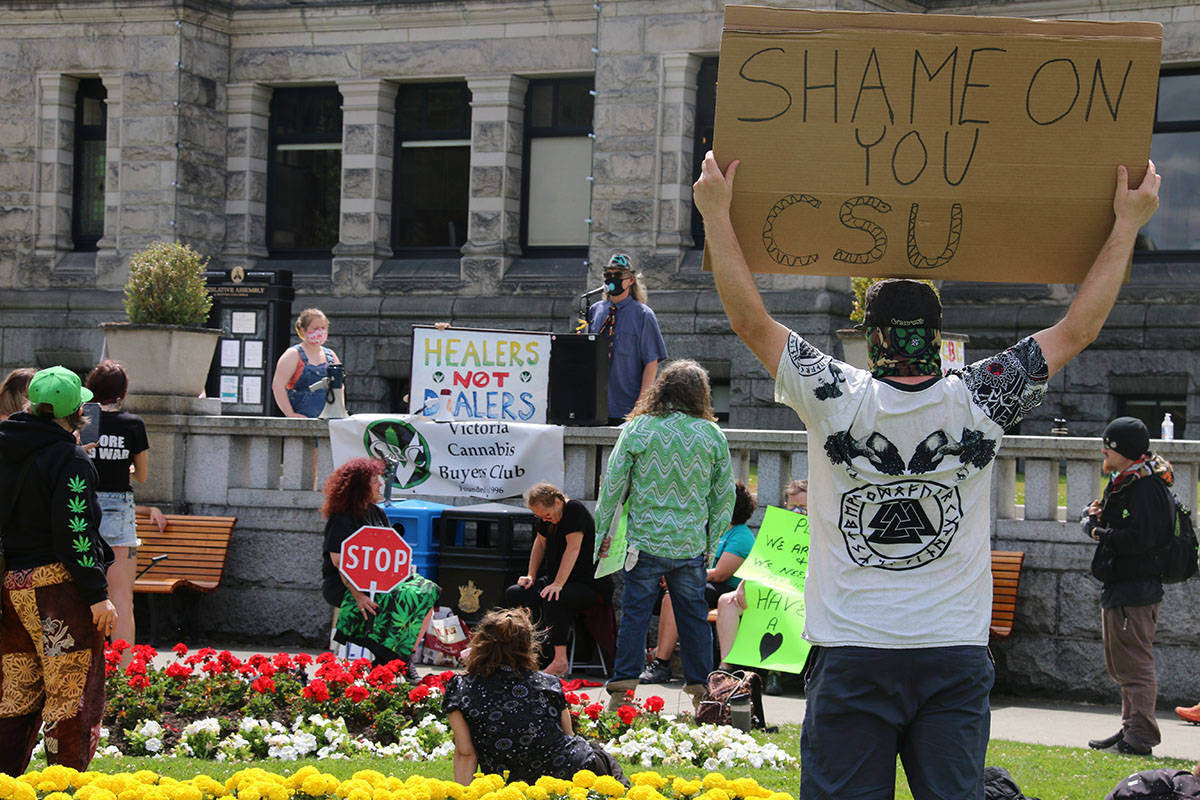The Select Standing Committee on Health is examining the ongoing overdose and drug toxicity crisis. As part of this work, the Committee is inviting British Columbians to give their input on the following areas:
- Government Response: What actions should government take to address the ongoing overdose and drug toxicity crisis?
- Improving Care: How should government and institutions improve services, support, and resources in response to the ongoing overdose and drug toxicity crisis (this includes, but is not limited to, prevention, harm reduction, treatment, and recovery)?
- Addressing Toxic Drug Supplies: What should be done to address the harm done by the increasingly toxic and unpredictable illicit supply of drugs?
The consultation closes Friday, August 5 at 3:00 p.m. (Pacific). The Committee will release its report by November 2.
Click here to access the survey and voice your opinion!
August 3rd, 2022
To the Standing Committee On Health,
I am the retail store manager and I am writing on behalf of the Victoria Cannabis Buyers Club, a long standing medical cannabis dispensary in downtown Victoria, BC. We are thankful for the opportunity to provide feedback on how the government can take action to address the ongoing overdose and drug toxicity crisis. We have a unique perspective and we know that if provincial legislators took seriously the capacity of medical cannabis to address the opioid epidemic, we would be able to make significant strides in reducing the harms of this epidemic quickly.
To begin, cannabis is an exceptional tool when it comes to addressing opioid addiction and there is a lot that the government can do to maximize cannabis’ harm reduction capacity. When cannabis is taken in high enough doses it is exceptionally useful at managing chronic pain, this has been well documented in Canada. Recent studies confirming the use of cannabis as a substitute for opiate drugs, legal and illegal, have confirmed what many of us have understood from patient testimonials. TILRAY and researchers at UBC have both released clear evidence confirming a significant decrease in opiate drugs use amongst patients with low barrier access to high potency cannabis products. Other studies in the USA point to how there is evidence of a decrease in opiate overdose deaths in areas where even a single dispensary exists.
Phillipe Lucas, a graduate researcher from the Centre for Addictions Research of British Columbia writes that there are “three important windows of opportunity for cannabis for therapeutic purposes to play a role in reducing opioid use and interrupting the cycle towards opioid use disorder: “1) prior to opioid introduction in the treatment of chronic pain; 2) as an opioid reduction strategy for those patients already using opioids; 3) as an adjunct therapy to methadone or suboxone treatment in order to increase treatment success rates.”
In March 2022, the VCBC received a significant letter of support from allies at the University of Victoria, researchers in substance use and harm reduction who agree that medical cannabis ought to be considered strongly as a tool in the work to address the opioid crisis. Spearheaded by. Dr. Marilou Gagnon, this letter was signed by several researchers working from the Canadian Institute of Substance Use Research and was addressed to the members of the provincial and federal government. Their letter states, “[c]ollectively, our research supports this approach and it has documented the benefits of cannabis for people who experience chronic pain, the substitution effect of cannabis among people who use unregulated opioids, and its positive impact on retention in medication-based treatment for opioid use disorder. A recent feasibility study also points to additional substitution benefits for people experiencing severe alcohol use disorder.”
- Government Response: What actions should the government take to address the ongoing overdose and drug toxicity crisis?
Cannabis is a medicine with a significant potential to help a lot of people, with minimal side effects and potentials for harm as compared to the ongoing harms of the opioid epidemic. Harms which have been fueled in part by the overprescribing of these opiate medicines in the past decades. One of the most efficient methods the government can take to address the ongoing overdose and drug toxicity crisis is to take seriously the capacity of medical cannabis to help patients and to provide this medicine more abundantly as an alternative to traditional prescription medications.
Currently cannabis is available through the legal medical model but the system is deeply flawed and inaccessible to most Canadians. To access medical cannabis patients need to have access to a general practitioner, then that doctor needs to agree to prescribe the patient cannabis, and then the medicine needs to be ordered online with a credit card and mailed to a home address. The barriers to access in this model are immense. It is our recommendation to educate and permit prescribers to more freely and easily prescribe medical cannabis to patients in need when it comes to a range of conditions.
Cannabis was illegal for a century, and for years the government dissuaded researchers from studying the therapeutic capacity of this plant. This has meant that generations of health care practitioners have no knowledge of the benefits or uses of therapeutic cannabis. This translates to countless patients across the country who are either afraid of asking their doctor for a prescription, are concerned they will get denied a prescription because the GP does not support the use of medical cannabis, or receiving inaccurate information from under-educated health care practitioners.
Recently in BC there was a review of the prescribing power of nurse practitioners to permit them to be able to prescribe opioids as a method of opening access to a safer supply. However, nurse practitioners were not given the capacity to prescribe cannabis? Opening up the range of prescribers able to recommend and prescribe medical cannabis to more patients would be an effective method of easing access to this valuable medicine. This needs to be done in combination with educational tools to assist medical practitioners in working with this medicine to maximize the benefits for patients across the country.
2) Improving Care: How should government and institutions improve services, support, and resources in response to the ongoing overdose and drug toxicity crisis (this includes, but is not limited to, prevention, harm reduction, treatment, and recovery)?
Prevention
Opioid use is most commonly associated with needs for pain management. To prevent the potential for opioid addiction, we implore the government to permit and encourage prescribers to look to cannabis as a pain management option before prescribing harmful and addictive opioids. Cannabis can be effective in low doses for some, and those with chronic conditions often need much higher doses. By permitting the sale and production of a range of products with low to high doses of THC and CBD, the government would be increasing access to a much safer medicine for patients. Low barrier access to high potency, low cost cannabis products reduces the use of dangerous street drugs that can cause overdose deaths.
Another important consideration is the point on access for people who use opioids. Existing grassroots community organizations are doing exceptional work to meet people who use opioids where they are at with storefront retailers in easily accessible locations. Programs like the Victoria Cannabis Buyers Club and SOLID provide medicine to opioid users in a dignified and low barrier outlet that is working to meet people’s needs right now. Our recommendation to the government is to maximize the utility of these existing community outreach programs and to treat them as pilot projects to learn how other organizations and models can be built to put cannabis medicine into the hands of those that need it most.
Harm Reduction & Treatment
High potency, low cost cannabis products are very effective in helping former addicts cut down and eliminate opiate prescriptions like methadone. This happens because cannabis works to manage a lot of the same symptoms as opioids. High dose edibles are extremely helpful for pain management, mood boost, and helping with sleep. We have also learned that cannabis is extremely helpful for those who are choosing to come off of opioids. Cannabis in high enough doses is an important tool for managing the symptoms of withdrawal: it manages shaking and inflammation, nausea suppressant, helps stimulate appetite, manages pain, and can induce drowsiness to help the body sleep and heal.
3) Addressing Toxic Drug Supplies: What should be done to address the harm done by the increasingly toxic and unpredictable illicit supply of drugs?
Ultimately we at the VCBC take the stance that most of the harms that come from the illicit supply of drugs is the ongoing failure that is the War on Drugs. The continued paternalistic approach to criminalizing substances will continue to fail over and over again until we take radically new approaches to regulating substance use. Substance users do not want to buy their substances from illicit sources, they are forced to do so because these products are illegal.
Users are forced to go underground and risk their safety and well-being to seek out the products that we know are going to be consumed regardless of their legal status. Discussing harm reduction while these substances are still illegal only pays lip service to reducing harm. . Ending the war on drugs, providing a safe, legal and accessible supply, and creating educational resources for those who chose to consume these substances is the only way forward.
Thank you for your time and consideration.
Jacqueline Kittel
Manager
The Victoria Cannabis Buyers Club




